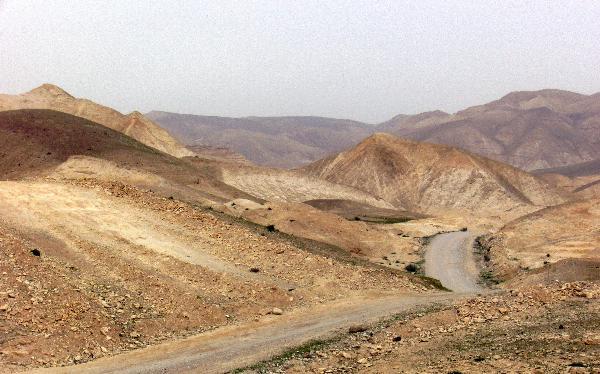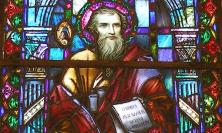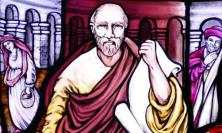The Year of St Paul calls us to reflect on all aspects of the life and work of the Pharisee who became one of the most influential writers in the early church. Bishop John Arnold describes St Paul’s conversion as a long journey in faith, rather than a singular event on the road to Damascus, and looks at what we can learn from this journey, in the second of a series of articles to mark the Pauline Year on Thinking Faith.
Pope Benedict XVI announced in 2007 that we should have a holy year dedicated to St Paul, beginning in June 2008 and lasting for one calendar year. St Paul’s letters are still the foundation of Christian spirituality today, yet there is as much to be learned by reflecting on his life as on his writings. How much do we know about him? To what extent does he influence the way I live my faith? How much more helpful might he and his writing be to me?
The Damascus Road Experience
It is unjust to suggest that everything happened in a blinding flash of light on the road to Damascus. Something dramatic certainly happened. It was enough to stop St Paul carrying out his mission of persecution. It seems to have been enough to put St Paul into a state of confusion, which began the process of conversion. It certainly did not impose a conversion on St Paul and dictate a change in his life.
St Paul was a Pharisee. He was fully trained and a very aggressive advocate for his faith. It seems that he hated this new Christian “sect”. He was prepared to persecute those who had become Christians and, according to the Acts of the Apostles, was on his way to Damascus to arrest the Christian community there. Whatever happened on the Damascus Road was enough to cause him to change his mind about his immediate intentions. But this could only have been the beginning of his own conversion to Christ.
We are given two different accounts of the aftermath of St Paul’s experience on the road to Damascus. In the Acts of the Apostles, we are told that he began to preach after only a few days with the disciples in Damascus (Acts 9: 20). It then suggests that he went quite quickly to Jerusalem where “he tried to join the disciples, but they were all afraid of him: they could not believe he was really a disciple” (Acts 9: 26). Having spent only a short time with them, and because of arguments with the Hellenists, he went to Caesarea and then to Tarsus (Acts 9: 30).
We belittle his struggle with conversion if we assume that it all happened in that blinding flash which threw him to the ground! St Paul has to make his own journey, as do we all. The extent of the journey that he had to make seems all the more momentous when we read the description that he himself gives, in the Acts of the Apostles, of his early life:
“I am a Jew,” Paul said “and was born at Tarsus in Cilicia. I was brought up here in this city. I studied under Gamaliel and was taught the exact observance of the law of our ancestors. In fact, I was as full of duty towards God as you are today. I even persecuted this Way to the death, and sent women as well as men to prison in chains as the high priest and the whole council of elders can testify, since they even sent me with letters to their brothers in Damascus. When I set off it was with the intention of bringing prisoners back from there to Jerusalem for punishment.” (Acts 22: 3-5)
In his letter to the Galatians, St Paul gives a rather different version of his conversion and its aftermath, one which better explains the length and significance of his journey:
Then God, who had specially chosen me while I was still in my mother's womb, called me through his grace and chose to reveal his son to me, so that I might preach the Good News about him to the pagans. I did not stop to discuss this with any human being, nor did I go up to Jerusalem to see those who were already apostles before me, but I went off to Arabia at once and later went straight back from there to Damascus. Even when after three years I went up to Jerusalem to visit Cephas and stayed with him for 15 days, I did not see any of the other apostles; I only saw in chains, the brother of the Lord, and I swear before God that what I had just written is the literal truth. After that I went to Syria and Cilicia, and was still not known by sight to the churches of Christ in Judaea, who had heard nothing except that their one-time persecutor was now preaching the faith he had previously tried to destroy; and they gave glory to God for me. It was not till 14 years had passed that I went up to Jerusalem again. (Galatians 1: 15-2: 1)
It seems then that the period after the Damascus Road lasted for up to 17 years. During this time he took himself off into the desert in Arabia where his “experience” had to mature as he found out more about Jesus Christ, and his faith began to grow. The “Damascus Road Experience” did not suddenly turn him into the “Apostle to the Gentiles”. It merely began a process of conversion which prepared St Paul for his mission.
The Journey of St Paul
The word “journey” suits the life and spirituality of St Paul in several ways. He makes his own journey of conversion which takes him from the rigidity of his life as a Pharisee, through his conversion, to the years of growing in faith, and then he undertakes lengthy journeys for his missionary activity and his teaching. The final stage of his journey is best seen in the pastoral letters to Timothy and Titus where he is seen to hand on the wisdom of leadership that he has amassed during his lifetime.
Tradition speaks of three missionary journeys, arduous travelling certainly, but still part of a single journey in the Spirit. He does not “set out” with particular destinations in mind or any particular timescale in which to complete his travels. But he keeps moving, staying in some cities for a considerable time (as in Corinth) and setting out as he feels prompted to do so by the Spirit. It is estimated that his journeys totalled some 28,000 miles.
St Paul also cultivates a sense of “journey” in the development of the spirituality and conduct of the communities with whom he has written contact. His letters are full of thanksgiving, for all that they have achieved, assessment about the progress that they are making, and encouragement for the next stage of their transition into communities fully centred on Christ.
There is real value in allowing that same sense of “journey” to be mirrored in our own lives and our own efforts to progress in faith.
Who was St Paul?
There are some prevalent difficulties in studying the works of St Paul and the man himself. In terms of his own biographical details we have two sources: we have his autobiographical remarks from his letters and we have the record left to us by St Luke in the Acts of the Apostles. Unfortunately, but understandably, the two sources are not always in harmony. For example, St Paul himself never speaks about being a citizen of Rome; though much is made of his citizenship in the Acts of the Apostles. As we have already seen, St Luke has St Paul returning to Jerusalem very quickly after his conversion, whereas St Paul tells us in his letter to the Galatians that it was three years after his conversion before he visited Jerusalem even briefly, and a further fourteen years before he returned to the city.
There is also the difficulty that St Paul never attempted to write a systematic description of his own belief and theology. For the most part, his letters are replies to questions that he is being asked by the communities that he has visited, or to whom he chooses to write in order to encourage or criticise. Only one letter has a more systematic approach. When Paul is planning to visit Rome he writes his letter to the Romans in order to introduce himself and to establish his credentials as a teacher of the Good News. But even this account falls a long way short of being a “Theology of St Paul”.
Many of the chapters of the letters of St Paul are difficult; some because they are theologically profound, others because they are answers to the communities and we do not know the questions that had been asked. Time is probably best spent finding some texts from the letters of St Paul which may help us in a practical way to live the faith that we profess. I certainly have my own favourites and I am glad to say that, from time to time, I discover more. You may well have your own.
Above all, it seems to me to be vitally important that I remind myself of something of the quality of the love of God in whom I believe and trust. And St Paul has plenty to reassure us there.
For I am certain of this: neither death nor life, nor angels, nor principalities, nothing already in existence and nothing still to come, nor any power, nor the heights nor the depths, nor any created thing whatever, will be able to come between us and the love of God, known to us in Christ Jesus our Lord. (Romans 8:38-39)
He has words which are startlingly direct:
Nothing therefore can come between us and a love of Christ, even if we are troubled or worried, or being persecuted, or lacking food or clothes, or being threatened or even attacked. (Romans 8:35)
Against that, of course, St Paul recognizes our weaknesses. Rather more surprisingly, he recognizes his own weaknesses:
I cannot understand my own behaviour. I fail to carry out the things I want to do, and I find myself doing the very things I hate. When I act against my own will, that means I have a self that acknowledges that the Law is good, and so the thing behaving in that way is not my self but sin living in me.
The fact is, I know of nothing good living in me – living, that is, in my unspiritual self, - for though the will to do what is good is in me, the performance is not, with the result that instead of doing the good things I want to do, I carry out the sinful things I do not want. When I act against my will, then, it is not my true self doing it, but sin which lives in me. (Romans 7: 15, 18-19)
This is really a startling self-revelation. This is St Paul talking about himself and recognizing his own weakness. And it is not as if this is an occasional failing, for he goes on to say:
In fact, this seems to be the rule, that every single time I want to do good it is something evil that comes to hand. (Romans 7: 21)
This has to be encouraging in itself, surely? While St Paul urges us on all the time to a sense of perfection in our lives, he honestly recognizes the human limitations that hold us back and the reality of life.
A Lifelong Journey
Maybe a Year of St Paul is just the sort of reminder we need of the progress we are each called to pursue for ourselves; not instant conversion, but a lifelong journey made up of small steps towards God.
Even when St Paul is encouraging the communities by commending them for their great progress, he still insists that they identify the next step:
Finally, brothers, we urge you and appeal to you in the Lord Jesus to make more and more progress in the kind of life that you are meant to live: the life that God wants, as you learnt from us, and as you are already living it. (1 Thessalonians 4: 1)
The Right Rev John Arnold is Auxiliary Bishop of Westminster and Titular Bishop of Lindisfarne.
Read more of Thinking Faith’s series on Saint Paul:
![]() Who Was Saint Paul? – Peter Edmonds SJ
Who Was Saint Paul? – Peter Edmonds SJ
![]() Paul the Pastor – Jerome Murphy-O’Connor OP
Paul the Pastor – Jerome Murphy-O’Connor OP
![]() The Vision of Saint Paul – Nick King SJ
The Vision of Saint Paul – Nick King SJ
![]() Getting to know Saint Paul today – David Neuhaus SJ
Getting to know Saint Paul today – David Neuhaus SJ
![]() Paul, Trinity and Community – Michael Mullins
Paul, Trinity and Community – Michael Mullins
![]() Power in Paul – David Harold-Barry SJ
Power in Paul – David Harold-Barry SJ
![]() St Paul and Ecumenism – Bishop John Arnold
St Paul and Ecumenism – Bishop John Arnold
![]() The Letter of Paul to the Philippians – Peter Edmonds SJ
The Letter of Paul to the Philippians – Peter Edmonds SJ
![]() Thinking about Christ?s Resurrection in the Year of St Paul – Gerald O?Collins SJ
Thinking about Christ?s Resurrection in the Year of St Paul – Gerald O?Collins SJ
![]() The Letter to the Colossians: Jesus and the Universe – Brian Purfield
The Letter to the Colossians: Jesus and the Universe – Brian Purfield






